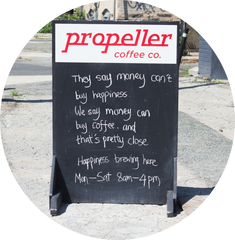Does Coffee Fight Depression?
Every Monday morning we understand the magical properties of a cup of coffee as it gives us that boost to get the week started. However, does drinking it do more for you and your taste-buds than what you originally anticipated?
When we went to visit one of our featured roasters from the September issue, Propeller Coffee Co., outside of the front of their café/roaster was an entertaining sign that read:

“They say money can’t buy happiness. We say money can buy coffee. And that’s pretty close. Happiness brewing here.”
It got us thinking. Does coffee actually improve happiness?
We dug into the scientific journals to see if there were any studies out there that helped answer this question. Most studies weren't looking at happiness, but rather the other side of the coin - the affect it had on depression and attempted to answer this question: Does coffee fight depression?
A study published earlier this year looked at how beverages like Soft Drinks, Juice, Tea and Coffee stack up against each other in terms of an impact on depression. They looked at the relationship between consumption & depression among 263,923 participants.
The Findings?
Frequent consumption of sweetened beverages, especially diet soda or diet juice, may increase depression risk among older adults, whereas coffee consumption may lower the risk. Tea was a push as there was no positive or negative correlation.
This study wasn't the only one which had similar conclusions.
Another study analyzing the depression risk within females found that relative risk of depression decreases with the more coffee you have. Having 4 cups per day or more will get you to as low of a risk as 80% of that of the women who consume 1 or less cup of caffeinated coffee per week. They found that depression risk decreases with increasing caffeinated coffee consumption.
A study from Finland found that heavy coffee drinkers had approximately 70% lower risk for depression than nondrinkers.
The first study discussed the potential physiological reasons as to why this is:
Coffee contains large amounts of caffeine which is a well-known brain stimulant. Caffeine and its major metabolites act on adenosine receptors in the brain and increase plasticity of hippocampal CA2 neurons, which may in turn contribute to lower risk of depression among coffee drinkers. In addition to caffeine, coffee and tea contain many antioxidants and phytochemicals which may also be responsible for our observations.
For the non-science majors, it most likely has to do with a combination of caffeine, antioxidants & phytochemicals in your cup of coffee that helps.
On the Phil & Sebastian website, they write:
Coffee has over 1200 identified chemical compounds, making it the single most complex food item. This type of complexity is what makes coffee so exciting for us, the potential for flavour, uniqueness and individuality.
But not only is that complexity interesting from a taste perspective, but apparently also from a health perspective.
And here we were all along thinking this was accurate:
Cheers!




